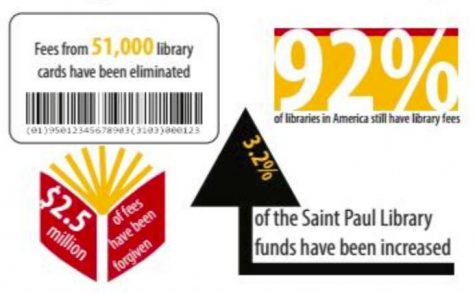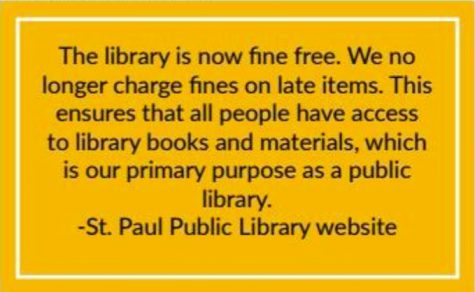New library fee policy ensures greater accessibility
February 21, 2019
An overhaul of Saint Paul Public Libary’s late fines makes access to reading materials easier and more fiscally responsible.
St. Paul Mayor Melvin Carter first proposed an overhaul of the Saint Paul Public Library’s fee system in Aug. 2018, wiping the slate clean for 51,000 library card holders whose access to books were blocked because of overdue book fees and making those same fees more forgiving. On Jan. 1 2019, his proposal was implemented as a part of the city’s 2019 budget.
The new system eliminates late fees altogether but still holds library users accountable for returning their books: users will be billed for lost items that have been overdue for 35 days. After an item has been returned, the fee will be wiped from the user’s account.

The new library fee policy announced by St. Paul Mayor Melvin Carter makes it possible for those from financially disadvantaged backgrounds to take advantage of the library’s resources and opportunities.
This new late fee system will increase access to free education across St. Paul’s demographics and make the library a more inclusive establishment. Minnesota has long faced drastic disparities in education. According to the Minnesota Department of Education in 2017, in grades three through eight and tenth twice as many white students as black students met state standards for math and reading. In the past 15 years, the number of schools where minority students make up 90 percent or more of enrollment has doubled. By eradicating late fees and forgiving previously accumulated fines, Saint Paul Public Libraries will become more accessible for readers of different economic statuses and help underserved students access school and supplementary materials for free.
According to the library’s website, the policy is fiscally responsible, because fines have historically not been a major form of revenue for the library and money collected has been steadily declining for the past ten years. Late fines have not been an effective deterrent for late books, and the new policy is beneficial for the St. Paul community.

“Our community is stronger and healthier when people have access to the programs, services, and materials they need to pursue their educational, career, family, and life goals,” the library’s website said.
SPPL’s new fine policy demonstrates Mayor Melvin Carter’s and the city’s renewed commitment to equal access to education and reading, no matter a person’s economic status.